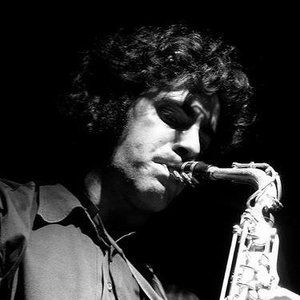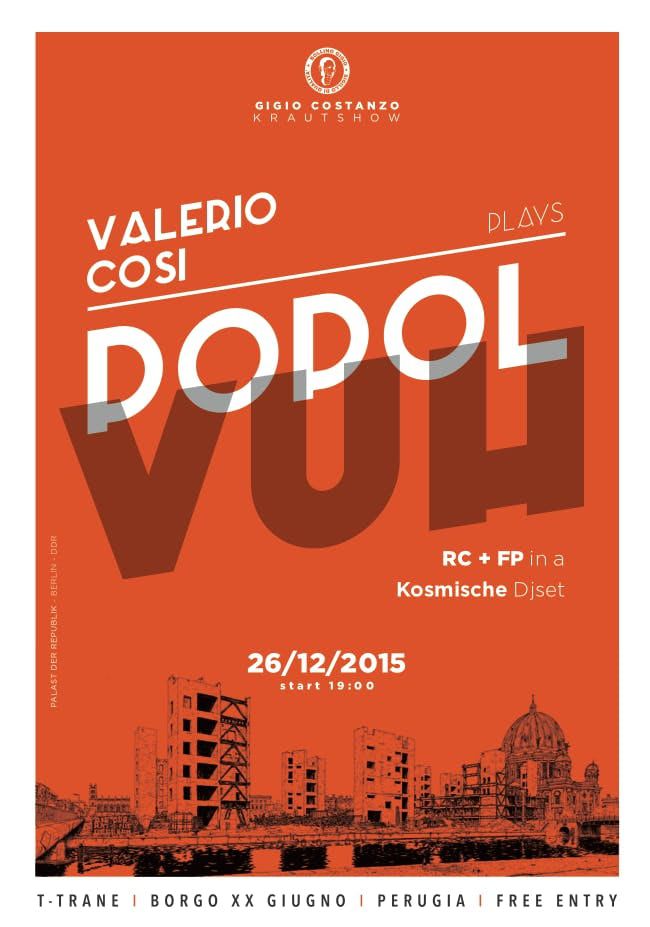Source: From email-correspondence, 2013
Author: Dolf Mulder
INTERVIEW VALERIO COSI ON 'VALERIO COSI PLAYS POPOL VUH'

Every now and then there appears a Popol Vuh-tune covered by a group or musician. With the new release by Italian musician and composer Valerio Cosi we have for the first time a work in our hands that is completely dedicated to Popol Vuh: “Valerio Cosi Plays Popol Vuh”. For this project interpreted several Popol Vuh tunes. I asked Valerio some questions.
- ‘Valerio Cosi plays Popol Vuh’. Why did you choose Popol Vuh? What is your fascination with Popol Vuh?
When I was a teenager, I used to listen to them a lot. There were two records that I really loved during those years: The Velvet Underground's third record (the one with "Candy Says" and "Pale Blue Eyes") and Popol Vuh's "Tantric Songs". They surely still are an incredible influence on my music and persona. I've been recording something like 100 tracks for "Tuinals", my new solo record made after a long time of silence, and I suddenly realized how much some of that new music I was shaping in my studio reminded me of the same calm and grace I used to find in Popol Vuh's records: that's how I really decided to make a record made of their tunes.
- How did you select the pieces? I don't know but I felt an immediate connection with their early works, especially "Affenstunde".
I live in a rural area of Southern Italy which I think is a perfect place for enjoying some relaxing and evocative pieces of music, I work in my studio almost every day and always tried to create a similar kind of music since 10 years or so. Have you ever heard my first album with Fabio Orsi? That's the kind of connection...
- What were you aiming at in interpreting these pieces? What is your musical vision in this context?
That's an interesting question. If you listen to "Plays Popol Vuh" you'll possibly realize that the spirit of the songs is all there, it's just the structure and the body that are changed. That's what I really wanted to do for this record, I didn't want to take all of their original instruments and do some nostalgia psychedelia. I just try to make my music in the best way possible and I always try to be very personal in some ways, sometimes I just say to myself: "make the kind of music you've always wanted to listen to" or "make something happen with your music", that's all.
- Listening to the excerpt of your reworking of ‘Train through Time’ on Soundcloud, I agree that it is somehow in line with original piece. A piece, by the way that was created by Fricke and Fiedler around 1997, using the Ensoniq TS 12, plus samples from older material: original train sounds, insects, percussion, voice. From what I hear in the your reworking is not made only from material from the original piece, but you added also things, like a saxophone near the end. Is that correct? It reminded me of early work of Terry Riley.
Yes, it's correct. Actually it's a pitched saxophone, I use to create lot of new sounds from my recording sources. I can consider myself a sound-sculptor that is capable to shape something out of nearly 'nothing' most of the time, that's how I normally work inside of my studio. I hate to use pre-engineered sounds and past them into a mix wihout any specific/heart-felted treatments, I love to create new sounds in first place (they're unrepeatable and it's very difficult for me to re-create them again after some time)... Every single sound has its own personality in my music. My early work has been heavily influenced by Terry Riley's first tapes with soprano sax. "Dorian Reeds" is one of the greatest recordings ever made! If you listen to my entire body of work with my saxophone involved, it should be not so difficult for you to identify this massive influence.
- You are making some of you earlier music available through Youtube. Several years ago you released ‘A Secret Homage to Florian Fricke’. Will this one by available too in the future?
Yes, I'm possibly going to include this track into my official YouTube channel. I recorded it (with the help of Enzo Franchini on percussions) soon after the "Conference Of The Aquarians" sessions in 2007. I made a lot of tape manipulations for the second part, the first part has some ethnic flavors. It is not a Popol Vuh's song and it wasn't intended to be a sort of cover, the whole atmosphere reminded me of Florian Fricke's work... then we decided to call it "A Sacred Homage To Florian Fricke".
- Many Thanks!. [Dolf Mulder, june 2013]
&
Part of interview with PAYNOMINDTOUS (posted on 2016.09.30), a Turin-based (Italy) non-profit organization registered in December 2018, operating since late 2015 as a webzine and media website:
D: Come prima cosa, vorremo parlare con te di tempo. Nelle tue ultime uscite discografiche (“Plays Popol Vuh” e “Sounds for Vajont”) abbiamo notato un interessante dialogo della tua musica con il passato: da una parte con la storia della musica, dall’altra con la Storia e basta. È interessante però sentire come il tuo approccio al passato, in questi due dischi, non sia mai revisionista o “facilone”. Nel caso dei Popol Vuh l’omaggio è, nei fatti, uno stravolgimento dei pezzi originali, o meglio ancora un tradimento dell’oggetto originale, che, tradito – cioè tramandato – viene filtrato attraverso la tua sensibilità e dunque per forza di cose deformato, così da poter vivere ed aver senso nel presente. Era questa l’intenzione originale dietro quel disco? E qual’è il tuo rapporto con il passato, nella tua musica, nella tua vita e in generale?
R: Direi di sì, il titolo è particolarmente fuorviante in questo caso. Delle melodie originali e delle textures non è rimasto granchè nel mio album, mi sono preso il lusso di adottare un sample molto corto dalla band e poi null’altro. Sono veramente terrorizzato dal revisionismo e dalla ripetizione delle formule. Penso che “Plays Popol Vuh” sia un album piuttosto rock, volevo che al suo interno coesistessero due anime: una profondamente aggressiva e psichedelica, l’altra elettronica ed emotiva. Ci sono brani che a loro modo preservano una vera e propria forma canzone (anche se con un cantato ridotto all’osso, come in “Train Through Time”) e potrebbe benissimo riallacciarsi idealmente al mio album su Digitalis del 2008. Per diverso tempo, mi sono divertito molto nel creare queste pseudo-citazioni, servono più che altro ad ingannare all’ascoltatore per poi dirgli “guarda che ti sto portando in un posto completamente diverso, allacciati le cinture di sicurezza”. Ad ogni modo, sento di aver già battuto queste strade e di non ripetermi più in futuro, proprio in virtù del fatto che odio ripetermi in musica. Non mi piace perfino l’idea di suonare gli stessi strumenti in tutti i miei brani. Nella mia musica, il passato è stato un espediente divertente che mi ha probabilmente guidato nel ricreare qualcosa che suonasse fresco e diverso da molti altri producer… non è affatto una mia ossessione.
Translation (Google Translate):
Q: First, we want to talk to you about weather. In your latest album releases (“Plays Popol Vuh” and “Sounds for Vajont”) we noticed an interesting dialogue between your music and the past: on the one hand with the history of music, on the other with History and that's it. However, it is interesting to hear how your approach to the past, in these two albums, is never revisionist or "easy". In the case of Popol Vuh the homage is, in fact, a distortion of the original pieces, or better yet a betrayal of the original object, which, betrayed - that is, handed down - is filtered through your sensitivity and therefore necessarily deformed, so that we can live and make sense in the present. Was this the original intention behind that record? And what is your relationship with the past, in your music, in your life and in general?
A: I would say yes, the title is particularly misleading in this case. There isn't much left of the original melodies and textures in my album, I took the luxury of adopting a very short sample from the band and then nothing else. I am truly terrified of revisionism and the repetition of formulas. I think "Plays Popol Vuh" is a rather rock album, I wanted two souls to coexist within it: one deeply aggressive and psychedelic, the other electronic and emotional. There are songs that in their own way preserve a real song form (even if with bare-bones singing, as in “Train Through Time”) and could very well ideally be linked to my 2008 album on Digitalis. For some time, I had a lot of fun creating these pseudo-quotes, they serve more than anything else to deceive the listener and then tell him "look, I'm taking you to a completely different place, fasten your seat belts". In any case, I feel that I have already traveled these paths and will not repeat myself again in the future, precisely by virtue of the fact that I hate repeating myself in music. I don't even like the idea of playing the same instruments in all my songs. In my music, the past has been a fun device that probably guided me to recreate something that sounded fresh and different from many other producers… it's not an obsession of mine at all.

